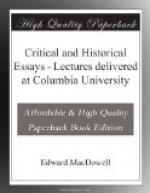But in the new art, music, we have found a new domain in which impulses have retained their freshness and warmth, in which, to quote Goethe, “first comes the act, then the word”; first the expression of emotion, then the theory that classifies it; a domain in which words cannot lose their original meanings entirely, as in speech. For in spite of the strange twistings of ultra modern music, a simple melody still embodies the same pathos for us that it did for our grandparents. To be sure the poignancy of harmony in our day has been heightened to an incredible degree. We deal in gorgeous colouring and mighty sound masses which would have been amazing in the last century; but still through it all we find in Haendel, Beethoven, and Schubert, up to Wagner, the same great truths of declamation that I have tried to explain to you.
Herbert Spencer, in an essay on “The Origin and Functions of Music,” speaks of speech as the parent of music. He says, “utterance, which when languaged is speech, gave rise to music.” The definition is incomplete, for “languaged utterance,” as he calls it, which is speech, is a duality, is either an expression of emotion or a mere symbol of emotion, and as such has gradually sunk to the level of the commonplace. As Rowbotham points out, impassioned speech is the parent of music, while unimpassioned speech has remained the vehicle for the smaller emotions of life, the everyday expression of everyday emotions.
In studying the music of different nations we are confronted by one fact which seems to be part and parcel of almost every nationality, namely, the constant recurrence of what is called the five tone (pentatonic) scale. We find it in primitive forms of music all the world over, in China and in Scotland, among the Burmese, and again in North America. Why it is so seems almost doomed to remain a mystery. The following theory may nevertheless be advanced as being at least plausible:
Vocal music, as we understand it, and as I have already explained, began when the first tone could be given clearly; that is to say, when the sound sentence had amalgamated into the single musical tone. The pitch being sometimes F, sometimes G, sudden emotion gives us the fifth, C or D, and the strongest emotion the octave, F or G. Thus we have already the following sounds in our first musical scale.




